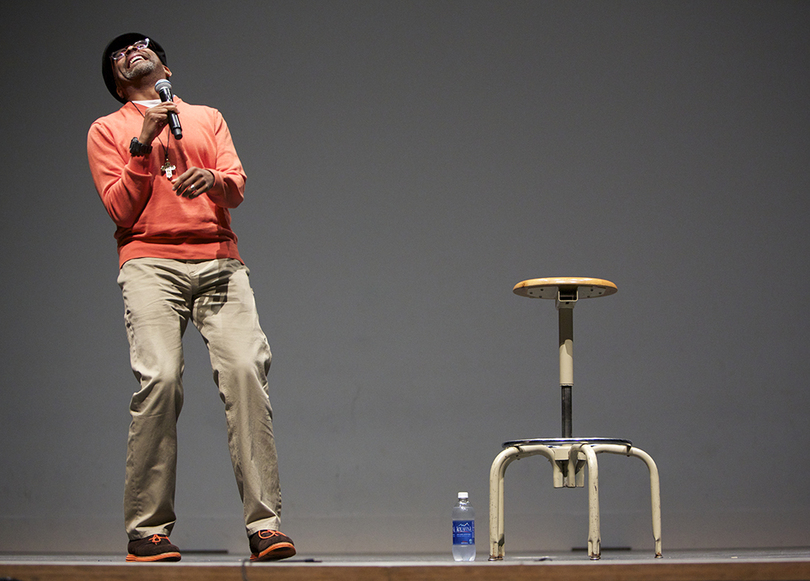Filmmaker Spike Lee discusses college years, path to success

Filmmaker Spike Lee speaks to Syracuse University students in Goldstein Auditorium Monday. During his informal lecture, Lee discussed the importance of education and pursuing one's dreams. / The Daily Orange
Decked out in an orange sweatshirt to match his orange shoes, filmmaker Spike Lee was dressed to represent both his hometown team, the New York Knicks, and Syracuse University.
The famous Brooklynite and current New York University professor spoke about his college years and his path to filmmaking in front of a packed Goldstein Auditorium on Tuesday evening. The National Pan-Hellenic Council at SU presented the event.
Lee began his informal speech by telling the audience he was a D-plus, C-minus student during his first two years at Morehouse College in Atlanta. When a student cheered at that announcement, Lee said success in school is no laughing matter.
“That’s the problem today,” he said. “We are championing ignorance. We’ve got to champion excellence. No one should be proud of being a D-plus, C-minus student.”
The summer after his sophomore year in 1977, Lee said he went home looking to make a little money. With the city having hit hard times economically, jobs were tough to come by. He ended up borrowing a friend’s video camera and taking footage of events that happened during the summer.
Lee went back to school with a newfound passion. He picked up a new major in mass communications at nearby Clark Atlanta University and used the footage from the summer to make a documentary.
“Junior and senior year, I was an A-plus student. And not just in my major,” Lee said. “Every class, I was an A-plus student. And why? Because now, I was motivated. I knew what I wanted to do for the rest of my life.”
Lee credited the start of his career to his teacher, Herb Eichelberger, who often stayed late to help Lee edit the documentary.
“There were many times at 6 o’clock when Dr. Eichelberger should be going home to his wife and children,” Lee said. “He would stay three or four hours just so I could continue to cut my film in the film lab.”
Lee said he also found support to pursue his dreams from his grandmother, who was able to pay for Lee to receive his undergraduate and graduate education.
It was the positive reinforcement from his grandmother that aided Lee in his success. He said it’s important never to pursue a major solely for the purpose of making money, even if your parents might be against it.
“A lot of times, when you choose a major that’s not business, that’s not law, that’s artistic stuff — that would be dancing, singing, writing, poetry — that’s when you get the stink-face look from your parents,” Lee said. “Parents kill more dreams than anybody.”
Lee concluded his speech by talking about the importance of education for young black men and women today. He noted that during the time of slavery, it was against the law for a black person to be able to read and write.
Previous generations, Lee said, risked their lives to become educated. Now, about half of the young black people in the United States graduate from high school, and more are incarcerated than enrolled in colleges, he said.
“So all these things are tied in together,” he said. “And really, as we move forward as a nation, it will be people like yourselves in the audience to get this stuff straight, because it’s messed up now.”





